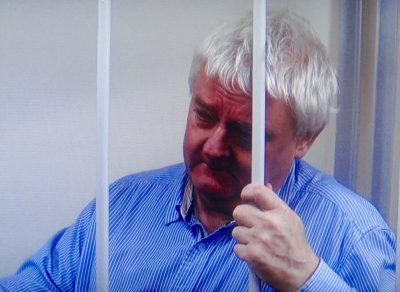Defense attorneys for retired Norwegian border inspector Frode Berg told newspaper Dagbladet on Sunday that Berg has now admitted he more than likely was in Moscow last December for Norway’s military intelligence agency known as E-tjenesten. Norwegian officials remain silent, while Berg himself sits in a Moscow prison, charged with spying.

Berg was arrested in Moscow during what he initially claimed was merely a weekend trip to visit friends and do some Christmas shopping. Berg has long been a promoter of friendly relations with Russia, and active in a variety of cross-border activities in his northern hometown of Kirkenes, where residents scoffed at the spying charges against him and have rallied to “bring Frode home.”
Criticism has been hurled against Norwegian authorities as well, for allegedly failing to offer Berg adequate support, legal and otherwise. Norway later agreed to cover Berg’s legal fees but neither Prime Minister Erna Solberg nor her foreign or defense ministers have wanted to comment on Berg’s case. A spokesman for the foreign ministry has said only that Berg was receiving “ordinary consular services” from the embassy in Moscow, like any other Norwegian would in such circumstances.
Courier suspicions
Russian officials have claimed all along that Berg was a spy, and that he was serving as a courier of information about Russian naval operations in the Arctic. He was found to be carrying 3,000 euros in cash when arrested by Russia’s federal security police FSB, the successor to the KGB, in broad daylight after leaving his hotel in downtown Moscow. FSB believes the money was to be sent to a Russian as payment for information about nuclear submarines in Russia’s northern fleet.
Berg, who has had tearful appearances in a Moscow court, claimed in February that he felt “misused.” Now the 62-year-old Berg, who faces 20 years in prison on the spying charges, has reportedly told his defense attorneys that his trip to Moscow was likely orchestrated by Norway’s national intelligence agency Etterretningstjenesten (E-tjenesten). He said he now believes he probably was duped into traveling several times to Russia for the agency.
“Frode Berg has been in despair for a long time over how he should handle the situation,” his Norwegian defense attorney Brynjulf Risnes told Dagbladet. Berg earlier has refused to tell reporters who actually asked him to travel to Moscow. “He felt loyalty to the Norwegian authorities and hoped they would stand up for him. Now Berg wants his version of the case to become known.”
‘Strong’ case against Berg
Berg’s attorneys (Risnes and Russian attorney Ilja Novikov) have described the Russian authorities’ case against Berg as “strong.” There are several aspects to it, however, that they argue should give Berg a milder punishment in the Russian legal system.
They met with Dagbladet in Prague under strict security conditions and where all sensitive conversations took place outdoors without any technical devices that could be tapped.
“Given the information that’s been presented (in the case), our client Frode Berg is certain that the man he met in Oslo last autumn, and who asked him to travel to Moscow to do what led to his arrest and the spying charges, worked for the Norwegian national intelligence agency,” Novikov told Dagbladet.
Novikov, one of Russia’s foremost defense attorneys, said Berg “understood very little of what he was dragged into. He’s a grandfather, a family man in retirement age. He never would have carried out anything that would leave him risking 20 years in prison.”
Norwegians must ‘show they care’
Novikov called on Norwegian authorities to become more active in Berg’s case and show that they care about him. That’s the only way, Novikov said, that Berg can avoid sitting for many years in a Russian prison. He and Risnes describe his role as a courier while he also met friends and was a tourist in Russia.
Risnes said Berg has told his attorneys about the people with whom he had contact before his last fateful trip to Moscow. They allegedly recruited him and sent him to several cities in Russia. One of the men is from Kirkenes and an old acquaintance of Berg. Dagbladet has his identity but decline to reveal it, other than reporting that the paper had confirmed the man has worked for E-tjenesten at the Høybuktmoen military facility in Sør-Varanger. He recently was transferred to E-tjenesten’s headquarters at Lutvann in Oslo, but repeated attempts to contact him failed.
He allegedly introduced Berg to another men and asked him to do a favour for him at a meeting in Oslo. He was identified as “Jørgen,” appeared to be Norwegian and spoke Norwegian with an eastern Norwegian dialect. “Jørgen” gave Berg some envelopes and asked him to mail them in Russia.
‘A consular matter’
Dagbladet reported that E-tjenesten “chose not to answer concrete questions” on Frode Berg’s situation. The agency also referred questions to the ministry, calling his case “a consular matter,” while all Norwegian government officials remain silent.
Frode O Andersen, communications chief for the foreign ministry, offered the following response to Dagbladet’s questions: “The foreign service continues to look after Frode Berg’s interests, among other things through visits to the prison to offer practical assistance and to attend court meetings. We have full understanding that this case is difficult for Frode Berg and his family. It’s important to make clear that there still is no indictment (against Berg) and that the case is still under investigation in Russia.”
Risnes claims that when E-tjenesten allegedly asked Berg to carry out assignments, “they also made sure he knew as little as possible. Berg knew nothing about the contents of what he was carrying during his visits, and he wasn’t aware of the serious nature or the bigger picture. We believe it is in his interests to illuminate this now.”
newsinenglish.no/Nina Berglund

